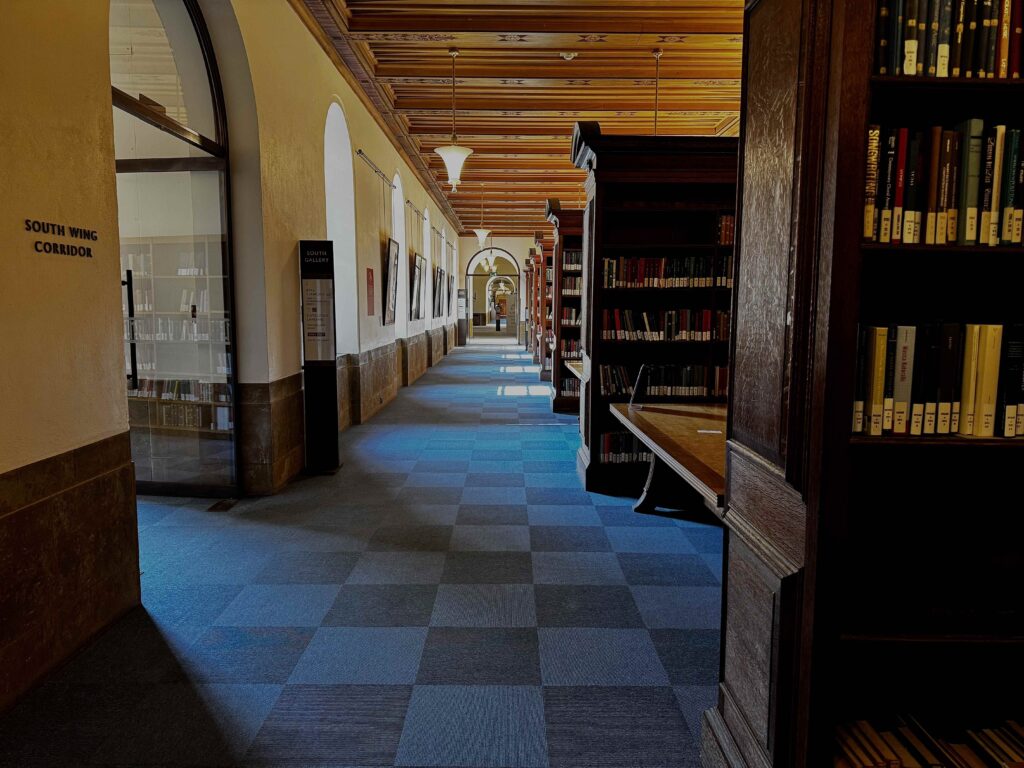Book haven

As regular readers know, I have a romantic view of libraries. I couldn’t live anywhere that did not have a decent one within easy reach — which is one of the many reasons for living in a university town like Cambridge. Last Saturday I urgently needed an arcane commentary on Pierre Bourdieu for something I was writing. Couldn’t find anything relevant online, so hopped into the car, drove for 20 minutes to the University Library, and went hunting in the stacks. As I walked back down with the book to check it out, I found myself in this corridor, and stopped to savour the peace and quiet of an institution which is dedicated to quiet contemplation. And felt lucky to have access to it.
Quote of the Day
“To get born, your body makes a pact with death, and from that moment, all it tries to do is cheat.”
- Louise Glück
Musical alternative to the morning’s radio news
Chet Atkins, Leo Kottke and Doc Watson | Last Steam Engine Train
Lovely jam session, especially when Chet Atkins gets going.
Long Read of the Day
The Glass Box And The Commonplace Book
Text of Steven Johnson’s Hearst Lecture. This is from 2010, but I was reminded of it during an email exchange with a reader of the newsletter. It had a big impact me at the time, and indeed reinforced my determination to continue keeping a paper notebook in addition to the usual digital tools.
The tradition of the commonplace book contains a central tension between order and chaos, between the desire for methodical arrangement, and the desire for surprising new links of association. The historian Robert Darnton describes this tangled mix of writing and reading:
”Unlike modern readers, who follow the flow of a narrative from beginning to end, early modern Englishmen read in fits and starts and jumped from book to book. They broke texts into fragments and assembled them into new patterns by transcribing them in different sections of their notebooks. Then they reread the copies and rearranged the patterns while adding more excerpts. Reading and writing were therefore inseparable activities. They belonged to a continuous effort to make sense of things, for the world was full of signs: you could read your way through it; and by keeping an account of your readings, you made a book of your own, one stamped with your personality.”
Each rereading of the commonplace book becomes a new kind of revelation. You see the evolutionary paths of all your past hunches: the ones that turned out to be red herrings; the ones that turned out to be too obvious to write; even the ones that turned into entire books. But each encounter holds the promise that some long-forgotten hunch will connect in a new way with some emerging obsession…
Read on. I hope you enjoy it as much as I did when I first read it.
My commonplace booklet

Cover of this week’s Private Eye.
Linkblog
Something I noticed, while drinking from the Internet firehose.
- The Penguin that followed a teacher home A really heartwarming story from the BBC World Service. Link
This Blog is also available as an email three days a week. If you think that might suit you better, why not subscribe? One email on Mondays, Wednesdays and Fridays delivered to your inbox at 5am UK time. It’s free, and you can always unsubscribe if you conclude your inbox is full enough already!
